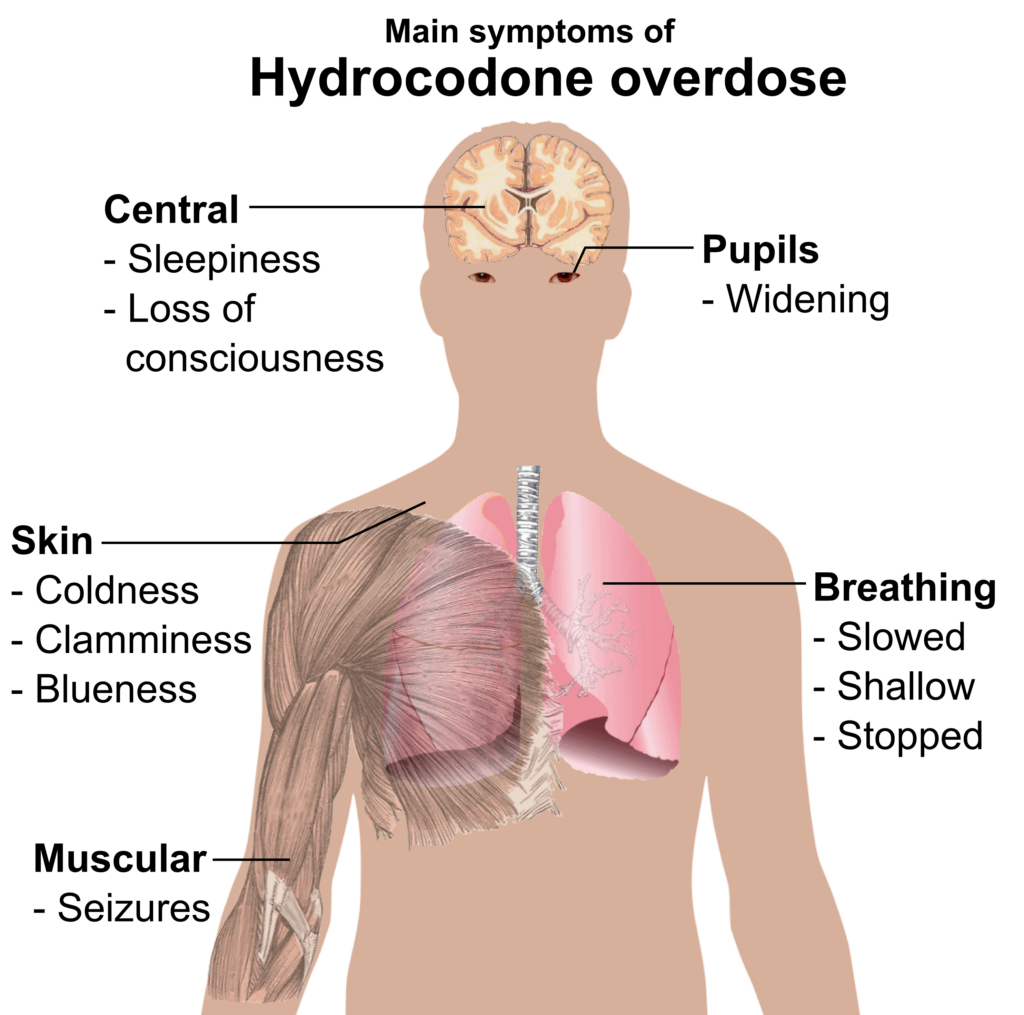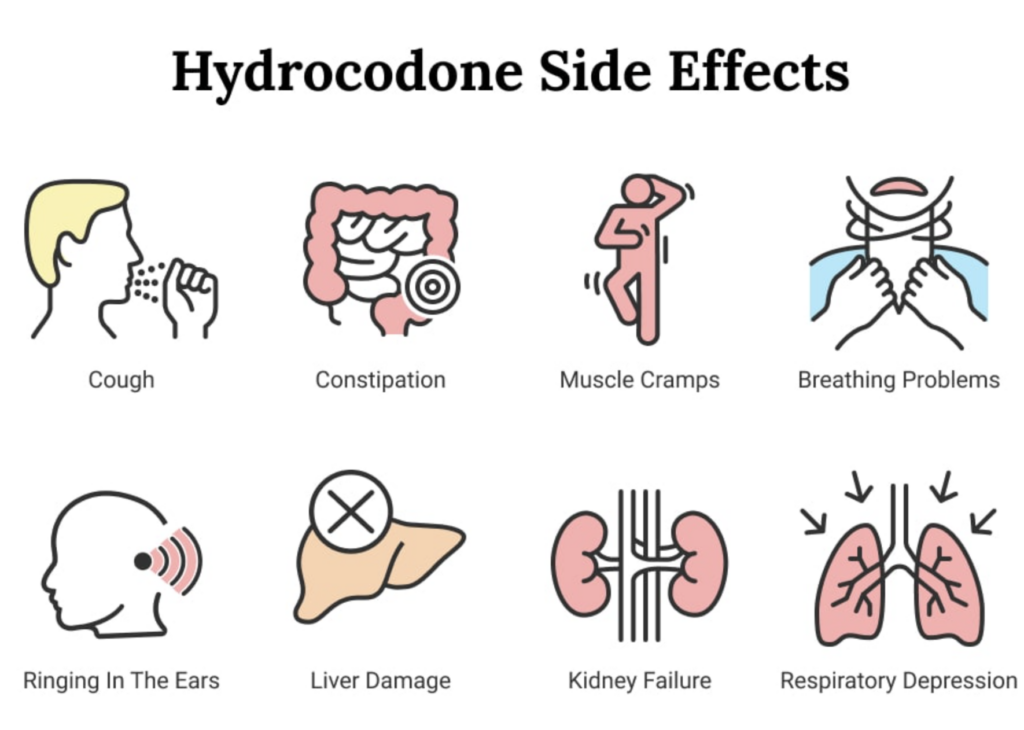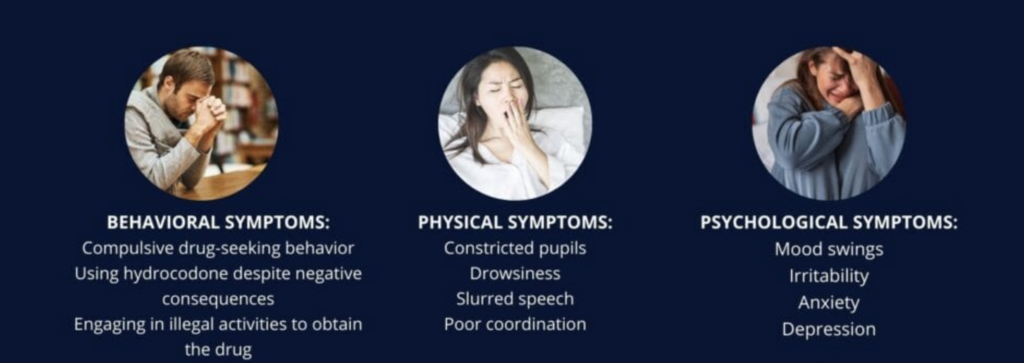Does hydrocodone make you sleepy? Yes, it often does. This article will explain why hydrocodone causes drowsiness, discuss other side effects, and provide tips for managing them.
Key Takeaways
- Hydrocodone primarily acts on mu-opioid receptors in the brain to alleviate pain but also induces drowsiness due to its depressant effects on the nervous system.
- Common side effects of hydrocodone include drowsiness, dizziness, constipation, and nausea, which can be managed through communication with healthcare providers.
- It is essential to recognize the signs of hydrocodone addiction, including neglecting responsibilities and intense cravings, and to seek professional help if needed.
How Hydrocodone Works in the Body

Hydrocodone is an opioid designed to target the central nervous system and provide relief from chronic pain that needs consistent management, as it isn’t suitable for managing short-term discomfort. What happens after this drug is ingested?
Upon consumption of hydrocodone, it interacts with the brain’s mu-opioid receptors, crucial players in achieving pain alleviation and causing sedation. By binding to these receptors, hydrocodone diminishes how intensely pain is felt and can also produce feelings of well-being due to its influence on these sites in the brain. The effectiveness of hydrocodone as a pain medication comes from this mechanism. It similarly raises concerns about misuse and developing dependence.
The effects of engaging with the brain’s mu-opioid receptors through hydrocodone extend beyond simply dulling pain—it may also trigger other responses such as sleepiness or lightheadedness. There exists a real hazard concerning addiction when using any opioid like hydrocodone improperly or over long durations.
Grasping how hydrocodones function inside your body underscores why adherence to prescribed guidelines matters significantly—and staying vigilant against potential abuse is essential. Now let us delve into what side effects are commonly associated with taking Hydrocodones.
Common Side Effects of Hydrocodone
Hydrocodone, like any medication, has a spectrum of potential side effects. Recognizing these adverse reactions is key to managing them and knowing when it’s time to seek professional advice. For detailed information on the drug’s use and its side effects, consult the provided medication guide.
Several usual side effects may occur with hydrocodone usage, which include feelings of tiredness or sleepiness (drowsiness), light-headedness (dizziness), bowel movement difficulty (constipation), and an upset stomach leading to nausea.
The onset of treatment or an elevation in dosage can often accentuate these symptoms due to increased sensitivity during such times.
The sedative properties inherent in hydrocodone account for experiences of drowsiness and dizziness because it dampens activity within the central nervous system. This reduction in brain function might also lead you to feel abnormally exhausted or off-balance. Hydrocodone use could cause your mouth to become dry while increasing perspiration levels as well as causing muscles across your body to constrict more than usual.
Another prevalent response from taking this medication relates specifically to its effect on one’s gastrointestinal functions: constipation is commonly reported by those prescribed hydrocodone. Should persistent issues arise regarding digestion—especially if faced with severe constipation—it is crucial that communication be established promptly with a healthcare provider about possible solutions including modifying how you’re currently being treated medically.
Understanding what’s normal when it comes down to common reactions linked directly back to consuming drugs such as Hydocodrone will empower proactive measures against unwanted consequences. Keeping open lines between patients themselves and professionals overseeing care guarantees safety plus efficacy concerning pharmaceutical applications involved here.
Why Hydrocodone Makes You Sleepy

Hydrocodone is known to cause drowsiness, but what exactly triggers this sensation of sleepiness? The drug works by activating mu-opioid receptors in the brain. This leads to a significant decrease in the excitability of neurons, which can result in feelings of sleepiness and make it hard to remain awake or attentive.
This medication also alters neurotransmitter levels within the brain. Hydrocodone escalates the action of inhibitory neurotransmitters, contributing even more. To its sedative effects. It is this combined impact on both opioid receptors and chemical messengers that not only allows hydrocodone to effectively alleviate pain but also causes you to feel sleepy.
An important aspect linked with hydrocodone use is respiratory depression – a condition where breathing becomes shallow and slows down. As your body takes in less oxygen due to depressed respiration rates, lethargy sets in along with increased drowsiness that may interfere with everyday functions.
Understanding why hydrocodone leads you into such tiredness will aid you in coping with this side effect more efficiently. Here are useful strategies for managing drowsiness when taking hydrocodide.
Managing Drowsiness While Taking Hydrocodone
It is essential to manage the sedative effects of hydrocodone, especially when it comes to avoiding severe drowsiness that can disrupt your daily activities. To ensure safety and effectiveness, refrain from consuming alcohol or other central nervous system depressants while taking this pain medication.
Should you forget a dose of hydrocodone, maintain your regular dose schedule by omitting the missed dose. This approach ensures consistent drug levels in your body and minimizes potential side effects like intense drowsiness.
To better control instances of sleepiness associated with hydrocodone use, consult your healthcare provider as they may adjust your dosage. Changes might include reducing the amount taken or altering when you take the medication alongside any other medications prescribed for managing pain.
Ongoing communication with your doctor is key for tailored guidance on effectively using various pain management strategies including different types of pain medications aimed at new or existing conditions—all without impeding day-to-day life.
Other Serious Side Effects to Watch For

Drowsiness is frequently experienced by those taking hydrocodone, but it’s crucial to be alert for more severe adverse effects. In uncommon instances, users might experience alarming symptoms like confusion or hallucinations that necessitate prompt medical attention.
Respiratory complications are a significant risk associated with hydrocodone use. Patients should watch out for signs such as difficulty in breathing and reach out to their healthcare provider if these issues arise. Particularly during the start of treatment or following dosage changes, one may encounter serious breathing problems including trouble catching breath and other related difficulties.
It’s also possible for allergic reactions to occur when using hydrocodone. These could present themselves through skin conditions or challenges in respiration. Should any indications of an allergic reaction emerge—especially severe drowsiness or difficulty with breathing—it’s imperative you contact your doctor immediately.
Promptly recognizing and responding to these critical side effects is essential. Keep open communication with your healthcare provider about any symptoms that develop or worsen and inform them without delay—some responses could pose life-threatening risks.
Recognizing Signs of Hydrocodone Addiction

Hydrocodone is only available through prescription and is tightly regulated to deter the misuse of hydrocodone as well as opioid addiction. Nevertheless, it’s imperative for those prescribed this medication, including hydrocodone prescriptions, to be aware that it has the potential to lead to dependence. A tell-tale behavioral indicator of this includes shirking responsibilities at home or in a professional setting.
Those grappling with addiction may find themselves withdrawing from social interactions with friends and family members. The overpowering desire for more hydrocodone can interfere significantly with normal life routines. Prolonged consumption can culminate in a physical dependence on the drug accompanied by withdrawal symptoms. Abruptly stopping its use could even result in a fatal overdose.
An escalation in tolerance levels towards hydrocodone points toward an escalating substance dependency. Absence of the drug might trigger various withdrawal indicators such as nausea, perspiration, and muscular discomforts. When someone consumes excessive amounts of hydrocodone over time, severe withdrawal effects might emerge, which include emotional instability – evident through heightened anxiety and despondency – marking psychological manifestations linked directly to addiction.
Prompt detection of these signals could facilitate timely intervention for oneself or loved ones requiring assistance overcoming an inclination towards hydrocodones abuse.In what follows we will outline local resources accessible within Massachusetts dedicated expressly to addressing dependencies related specifically to usage patterns around substances like Hydrocondones.
Local Resources for Hydrocodone Addiction Treatment
Should you or someone close to you be grappling with an addiction to hydrocodone, it is imperative to seek out professional assistance. Paramount Recovery Centers in Massachusetts stands as a premier facility for tackling such addictions. Their suite of services encompasses medical detoxification, both inpatient and outpatient rehabilitation programs, along with sustained care designed to promote lasting recovery.
Similarly committed to providing empathetic support and the necessary resources for embarking on a new chapter is Orlando Recovery Center. They too present a broad range of treatment possibilities that span from medical detoxification procedures through various rehabilitation programs available on either an inpatient or outpatient basis.
It’s essential for those struggling with hydrocodone dependency to tap into these local facilities which offer vital aid and direction needed for conquering the addiction. The centers are well-prepared whether immediate medical intervention is required or if there’s a need for enduring support mechanisms.
Engaging with a healthcare provider can open up discussions regarding your choices and mark the commencement of your journey towards recovery—initiating this dialogue showcases resilience rather than vulnerability.
Summary
In summary, hydrocodone is a powerful opioid used primarily for chronic pain management. It works by acting on the brain’s mu-opioid receptors, but it comes with a range of side effects, including drowsiness, dizziness, and constipation. Understanding these effects and how to manage them is crucial for anyone using this medication.
Recognizing the signs of hydrocodone addiction is equally important. Behavioral and psychological symptoms can indicate a developing addiction, and seeking professional help is essential. Local resources in Massachusetts, such as Paramount Recovery Centers and Orlando Recovery Center, offer comprehensive treatment options.
By staying informed and proactive, you can manage the effects of hydrocodone safely and effectively. Remember, your health and well-being are paramount, and seeking help when needed is a critical part of that journey.
Frequently Asked Questions
Why does hydrocodone make you sleepy?
By stimulating the mu-opioid receptors in the brain, hydrocodone promotes the activity of inhibitory neurotransmitters that lead to sedation and a reduction in neuronal excitability. This action accounts for its ability to cause drowsiness.
The sedative impact of hydrocodone can be attributed to this process.
What are the common side effects of hydrocodone?
Common side effects of hydrocodone include drowsiness, dizziness, constipation, nausea, dry mouth, increased sweating, and muscle tightening.
It is important to monitor these effects and consult a healthcare professional if they persist or worsen.
How can I manage drowsiness while taking hydrocodone?
To effectively manage drowsiness while taking hydrocodone, it is essential to avoid alcohol and other CNS depressants, maintain a consistent dosing schedule, and consult your doctor for possible dose adjustments.
What serious side effects should I watch for when taking hydrocodone?
You should watch for serious side effects such as hallucinations, severe drowsiness, respiratory issues, and allergic reactions while taking hydrocodone.
Contact your doctor immediately if you experience any of these symptoms.
Where can I find help for hydrocodone addiction in Massachusetts?
You can find help for hydrocodone addiction in Massachusetts at Paramount Recovery Centers and Orlando Recovery Center, which provide comprehensive treatment options.
Seeking professional assistance is crucial for effective recovery.



